How Can We Conduct Water Rituals in a Way That Does Not Encourage Water Pollution?
For those who might be wondering what “water rituals”, or Aja Mmili, as they are called in Igbo are, they are sacred practices that involve communion with the forces of water for cleansing, renewal, and communication with spiritual energies. These rituals carry deep spiritual meaning and have been practiced for generations in Igbo spiritual traditions.
However, as the world has changed over time to introduce items like plastics and other synthetic components that are not so compatible with the earth, it becomes crucial to ask: How can we continue these practices while ensuring we do not harm the very element we seek to honor?, and how did our ancestors who did not have to deal with these synthetic components carry out those same rituals?
The Sacredness of Water
In Igbo spirituality, Water (Mmili/Mmiri) is a living force, a sacred body of intelligence. It is a direct incarnation and manifestation of pure source energy (Nnechukwu), a purifier, and a carrier of intention. In many ways, how we treat water is how we treat life. Conducting rituals in polluted water or polluting water during rituals disrespects the very essence of what water represents in Igbo worldview: life, purity, and balance.
Principles for Conducting Eco-Respectful Water Rituals
Use Biodegradable Offerings: Offerings during water rituals should come from nature and return to nature without causing harm. Avoid plastic wrappers, synthetic cloths, or anything that will not degrade naturally. If using candles or incense, avoid those with artificial fragrances or dyes.
Avoid Blood Sacrifices in Water Bodies: While traditional sacrifices may sometimes involve animal blood, it is very important to understand that spilling blood into water contributes to pollution and disrupts aquatic life. Consider symbolic or alternative offerings that can carry the same spiritual intention without causing ecological harm.
Do Not Leave Ritual Debris Behind: Always clean up after a ritual. If you bring items that contain or carry your food offerings, take them back with you unless they are biodegradable and intentionally left with full awareness of their impact.
Conduct Rituals During Low Human Activity Times: This respects both the spiritual energy and the environment, giving space for the water to rest and for the ritual to occur with fewer disturbances. Early morning or late evening are usually ideal.
Build Community Awareness: Encourage collective responsibility. Teach others within your spiritual community the importance of protecting water bodies. Share knowledge about eco-responsible rituals and encourage group cleanups before or after collective rituals.
Consult the Spirits, but Also Use Common Sense: Mmuo mmiri, the spirits of water appreciate purity and respect. Before a ritual, consult your spiritual guides or dibia, but also apply practical reasoning. Ask yourself: "Is what I'm offering or doing adding to the harmony of this space, or is it causing harm?" And if it is causing harm, how then can that lead to good energetic output for you?
The Spiritual Impact of Pollution
Polluting a water body through careless rituals not only harms the physical environment but also diminishes the spiritual potency of that site. Sacred water loses its power when it is overwhelmed by toxins, just as a person loses vitality when overwhelmed by disease. It is a contradiction to seek healing or blessings from a space you are simultaneously degrading.
Final Thoughts
As modern Odinani practitioners, we have a responsibility to align our practices with the values we claim to uphold. Protecting and respecting the Earth is not separate from our rituals, it is at the heart of them. When we honor water as sacred and treat it with care, our rituals become more powerful, more meaningful, and more aligned with universal balance.
May our spiritual journeys always reflect the harmony we seek. Yagazie!









